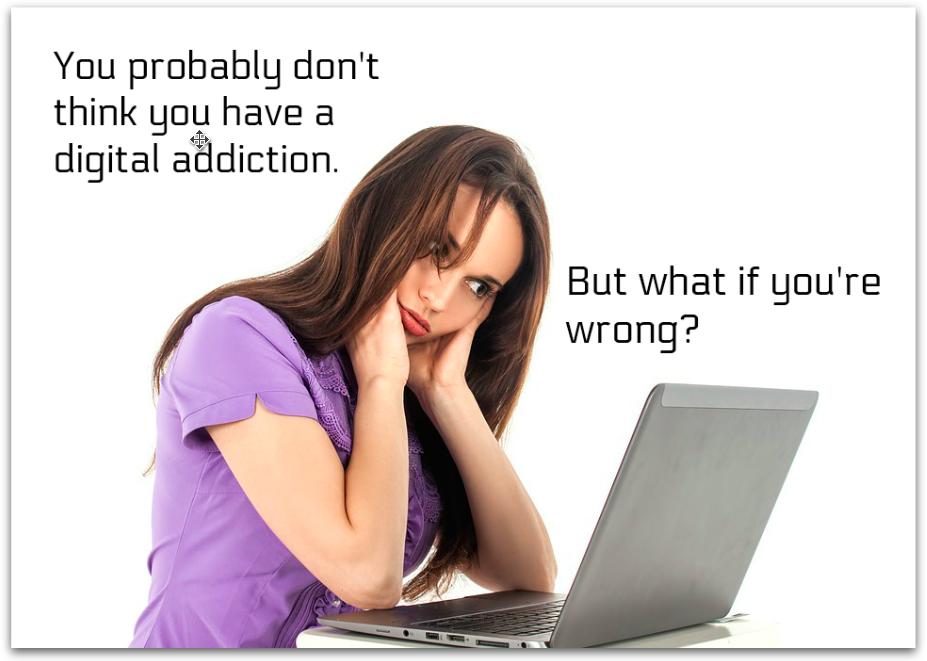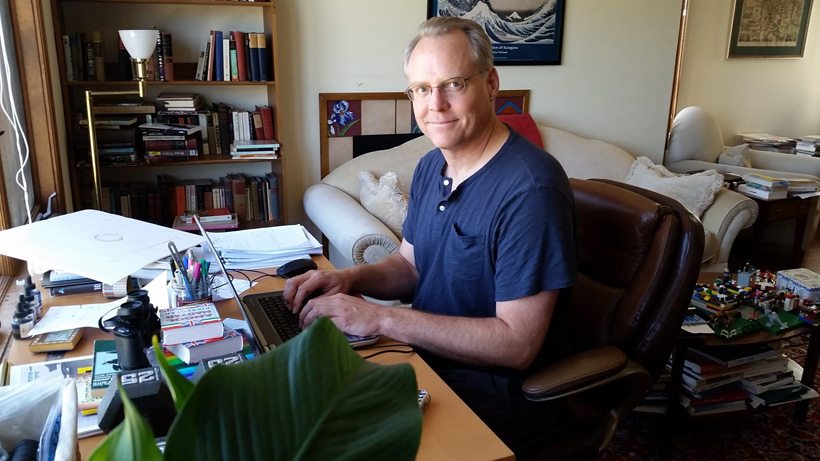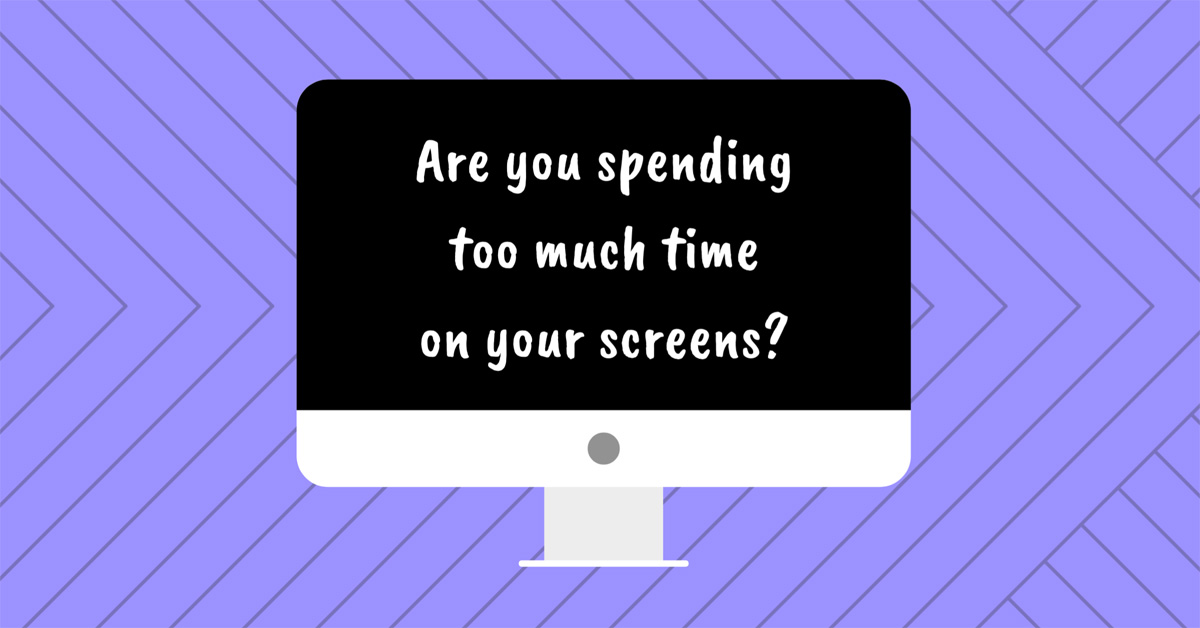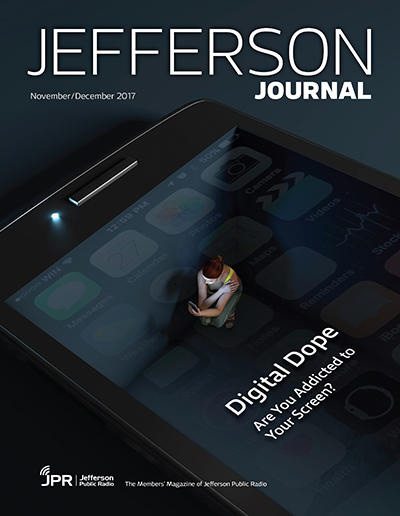
What if you have a digital addiction? What if you’re using screens so much it’s bad for your brain?
Digital addiction?
A digital use disorder?
Do you have one?
Does your child?
Do I?
At the park yesterday with my second grader, I saw a baby sitting on a blanket teething on her mama’s smart phone.
Walking home we passed a toddler in a stroller watching cartoons on a tablet.
My 14-year-old, still sweaty from basketball, was poking around on his iPhone when we came in.
“Go away!” My 16-year-old quipped to us.
She was lying in bed reading a book on her phone.
“I’m at a really good part.”
Leone and I wandered into the kitchen. My husband was—you guessed it—on his phone consulting a recipe for the steak he was about to broil.
It’s a brave new digital world where celebrity babies in utero, I’ve heard, send out tweets from the womb.
I’m a professional writer. I have a she shed behind my house.
When I’m not traveling to report on a story (like this one or this one) or to do research for a book (like this one or this one) or an article, or giving a talk, you’ll almost always find me working from home, usually at my standing desk.
On a typical day I spend at least seven hours at the computer.
When I’m not writing, I’m reading articles on the internet, researching potential experts to interview, or searching PubMed for scientific studies.
I’m also active on social media.
Find me on Facebook here or here; twitter here; LinkedIn here; Pinterest here. (See what I mean?).
I check email many times an hour. I’ve been spending more time writing blogs as well.

Stephen Sloan, a successful business consultant who lives in Ashland, thinks his digital addiction is getting in the way of him having a more meaningful and productive life. Photo by Jennifer Margulis.
Creation or Consumption? Digital Addiction is Consuming Media, Not Generating It
When I interviewed business consultant Stephen Sloan, a self-described “digital addict,” for this article on digital addiction in the Jefferson Journal, Sloan explained that he has tried to teach his teenage son to use the smart phone as a creative device that enhances intelligence, not a consumptive device that co-opts consciousness.
I like that concept: use your phone and your computer to create, not to consume.
I do my best to use the internet as a creative tool, instead of a consumptive one.
But, like most adults in America, I also spend an inordinate amount of time consuming media.
The average Baby Boomer spends over eleven hours a day—more time than they spend sleeping—consuming media, according to the Nielsen Company.
While this is a great boon for media companies, our collective digital addiction may not be so good for us.

You probably don’t think you have a digital addiction. But what if you’re wrong?
My grandfather was an early adopter.
He was one of the first on his block in Mount Vernon, New York to purchase a television, a Freed Eisemann with a big mahogany cabinet and a small screen, which he was delighted to watch with his wife and three children.
Back then people believed that television’s revolutionary technology was going to make us all smarter.
For the most part, they were wrong.
Watching too much television has been shown to make us more depressed, addicted, and stupid.
Smarter?
Not so much.
It seems that the same thing is happening with our incessant “smart” phone use and internet access.
We thought—perhaps we still think—the internet would make us smarter, more global, and more aware.
We thought—perhaps we still think—the internet would give our kids a jumpstart in life.
For the most part, we may be wrong.
Instead of making us smarter, constant internet access and smart phone use seems to be
I’m Worried About My Digital Addiction

The author’s cover story on digital addiction in the Jefferson Journal has her worried about the excessive amounts of time she is spending on-line
My second grader, her friend M., and I decided to bike to the movies.
We took the short cut across Southern Oregon University’s campus.
I trotted along as the girls took turns on my daughter’s bicycle.
M.’s new to bicycling and was having trouble steering.
“Hit the guy on his cell phone!” I cried as she wobbled along. “Ten extra points!”
“No!” M. protested, and we all laughed.
The young man coming towards us was so engaged with his cell phone screen that he didn’t even look up.
He never noticed we were talking about him.
We worry about young kids’ digital use and abuse most.
We worry kids will suffer from digital addiction.
But I think we adults should be just as worried, or more worried, about ourselves.
We humans thrive on human interaction, human touch, eye contact, lovemaking, feeling connected and part of a community, working towards the greater good.
We need time to daydream and reflect on life.
We need time to socialize and spend with others, especially our right tribe.
Like children, we adults need, sometimes, to be bored.
But courtesy of our smart phones, computers, and non-stop digital access, we are constantly overstimulated, no longer able to focus on big books (when’s the last time you read War and Peace or Middlemarch?) or big ideas.
The second we have downtime (in a restaurant, at the dentist, even when we just go to the bathroom to take a leak), so many of us turn immediately to curated content on the internet.
I’ve noticed more and more that adults walking to work and school—like the young man we almost crashed into at SOU—rarely look up from our phones, even when we’re crossing busy streets.
(Some believe the sharp and disturbing rise in traffic-related deaths are due to driving and walking under the smart phone influence.)
We don’t make eye contact anymore.
We don’t wave at our friends.
We don’t take the time to admire the fall leaves changing around us.
And, it turns out, young adults are watching porn on-line instead of seeking out real-life romantic and sexual experiences.
I worry that the constant allure and short-lived dopamine rush of the digital world is destroying our ability to have meaningful relationships and lead healthy lives.
I’m worried about my kids having a digital addiction, sure. But mostly I’m mostly worried about myself, my colleagues, my friends, and my peers.
You know what worries me, Margulis?
All the f*cking harm you’ve done to public health with the bullshit you and Paul Thomas publish
Thanks for taking the time to share your thoughts with my readers and me, Dr. Chris Hickie, MD/PhD. I’m glad to be in dialogue. It saddens me that you are a medical doctor and a PhD and yet you lack decorum to this degree and think it’s okay to use profane, unkind, and inflammatory language in a public form (or any forum, for that matter). As you know, the comments on this website are searchable by Google. Your potential patients can take note and decide if they want a doctor who spends his time harassing journalists, health researchers, and other MDs on-line.
Let’s not forget the history of Public Health .https://www.ncbi.nlm.nih.gov/pmc/articles/PMC1449322/
I am grateful for those who stand up as watchdogs instead of lapdogs to a system whose declared intentions are not to the health of the individual. As a doctor you should know it isn’t the individual patient who should be your main priority. Not to a corrupt agency heavily influenced by industry.
I so agree! I am so glad I raised my kids before the age of handheld devices. I know had I been breastfeeding a baby in the digital age I would have been looking at my phone instead of into their eyes, cooing and interacting with them. Thankfully my own kids are very aware of putting away the phones while with my grand babies (except for taking pictures of course!)
I worry about the same thing. We’re trying to make changes for the whole family, but it is definitely not easy!
I think this is a real problem. I try to walk away from all screens two hours before bed!
It is overwhelming. Thanks for the article. I have long felt that there is an addictive quality to the
emitting EMFs as well as the obvious ‘addiction to news + info’ that seems to be prevalent every where.. Worth a good discussion with family + friends.
I try to balance each day with time in nature or some time outdoors (even in frosty Feb!)